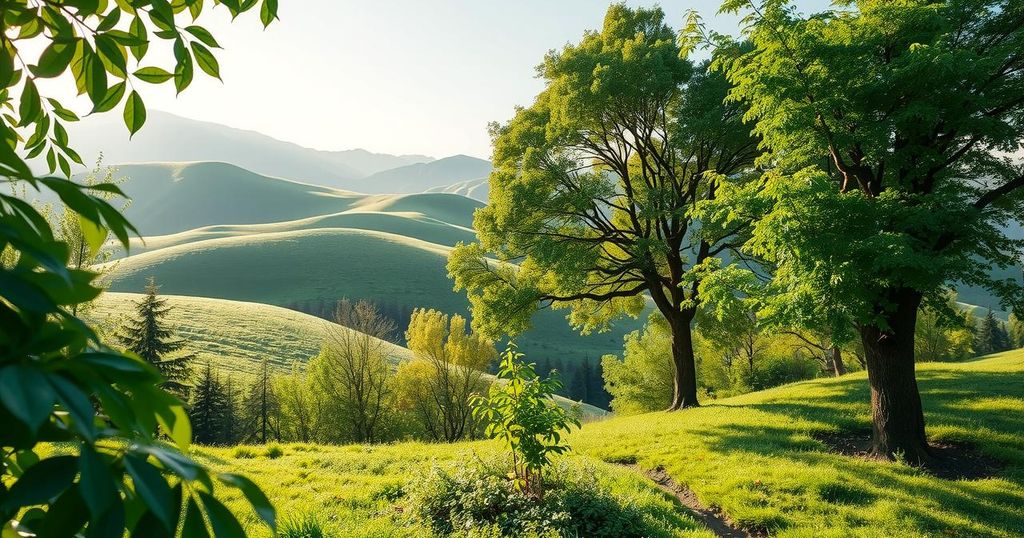Reforesting Malawi’s Mount Mulanje: A Critical Effort to Revive Vanishing Woodlands
Malawi’s Mount Mulanje is facing severe deforestation, threatening its unique biodiversity and cultural significance. The Mulanje Mountain Conservation Trust is spearheading efforts to restore the Mulanje cedar and engage local communities through sustainable practices. Following Tropical Cyclone Freddy, the area requires urgent action to mitigate environmental challenges and economically empower residents. Conservation initiatives emphasize community involvement and the protection of miombo woodlands as critical solutions.
Malawi’s Mount Mulanje, an ecologically rich area, is witnessing alarming deforestation, affecting both its miombo woodlands and high-elevation forests. This mountain, acknowledged for its biodiversity and cultural significance, serves as a critical watershed for local communities and harbors various endemic species.
Over the past two decades, the Mulanje Mountain Conservation Trust has made efforts to restore the Mulanje cedar, the national tree of Malawi. Conservation initiatives also incorporate income-generating projects in the surrounding miombo woodlands to alleviate poverty and lessen environmental pressure.
In March 2023, Tropical Cyclone Freddy struck, resulting in severe destruction, displacing over 650,000 individuals and leading to the deaths of more than 600 people. Communities around Mount Mulanje bore the brunt of the cyclone, and extensive illegal logging practices have contributed to the area’s deforestation and susceptibility to natural disasters.
Once a lush environment bustling with diverse flora and fauna, the mountain is increasingly barren, with diminished availability of resources such as water, fruits, and firewood. The dire situation has forced residents to encroach further into protected areas and deplete remaining natural resources.
Malawi remains one of the poorest nations globally, where 70% of the population lives below the poverty line. Climate change exacerbates difficulties, affecting rainfall patterns and leading to droughts and intrusive pests, placing further reliance on the delicate ecosystems.
From 2002 to 2023, nearly 600 hectares of primary forest in the Mulanje Mountain Forest Reserve have been lost. This alarming deforestation is partially attributed to the economic struggles faced by local communities, which compel them to resort to logging as a means of survival.
The Mulanje cedar, a tree found only at specific elevations, has suffered significantly, with strict regulations failing to prevent its decline due to corruption and law enforcement challenges. Recent surveys indicated that only seven trees remain, prompting conservationists to take action in restoring this iconic species.
Collaborative efforts to rehabilitate the Mulanje cedar include planting thousands of seedlings annually and enhancing strategies for protecting them from fires. Community engagement has also proven beneficial, as locals participate in reforestation and fire suppression initiatives, fostering a sense of stewardship.
Many challenges persist, including ongoing threats from wildfires exacerbated by climate change and illegal activities. Although Malawi has laws against illegal logging, enforcement remains a substantial hurdle in ensuring the protection of the Cedars and other trees in the region.
In parallel, conservationists work to restore the surrounding miombo woodlands, which could serve as essential protective buffers for Mount Mulanje’s unique ecosystems. Various initiatives aim to bolster local economies while promoting sustainable practices such as harvesting edible fruits and producing essential oils.
The urgent need for assistance highlights the precarious state of Mulanje’s biodiversity. Support from external sources could provide sustainable funding for conservation efforts, critical for safeguarding the region’s environmental legacy and improving the livelihoods of its inhabitants.
Restoring Malawi’s Mount Mulanje is vital for sustaining its unique biodiversity and supporting local communities. Significant environmental challenges, including deforestation and climate change, necessitate urgent conservation efforts. Engaging local communities in restoration and sustainable management, coupled with improved enforcement of protective measures, are essential for the survival of the Mulanje cedar and the overall health of the ecosystem.
Original Source: news.mongabay.com




Post Comment